Top 10 Reasons Not To Get Life Insurance

At Insurance Hero, we do everything possible to set you up with the best possible life insurance policies that suit your needs.
What if, then, you don’t actually need life insurance? Are there any reasons not to get life insurance?
Truthfully, as much as we’d love to sell you a policy anyway, there are perfectly valid reasons why you might not want to get life insurance. We’ve compiled ten reasons here today and a little more information that might make you reconsider.
Compare Life Insurance Quotes From The UK’s Top Providers, Completely Free Service, Save Money Today

Reason 1: Life Insurance Can Be Expensive
Perhaps the biggest argument against life insurance is that it can be expensive.
The thing is, that isn’t always true.
Like any insurance, costs can vary greatly depending on your circumstances. Some people can get life insurance coverage for just £6 per month. These people tend to be younger, healthier, and in better life circumstances.
The older you get, the more the weight of life tends to bear on you and the more your policy can cost.
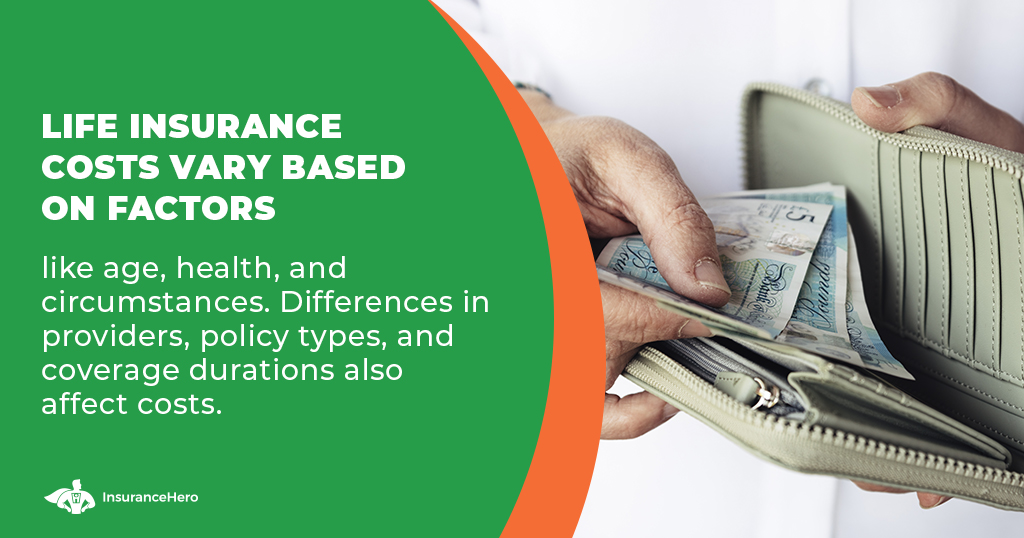
There are a lot of differences in terms of life circumstances, but also in terms of providers, and differences between term and whole life insurance. The cover you get, how long it lasts, and whether or not the rate adjusts over time will all vary.
Then again, can you put a price on supporting those close to you? Whether you’re a new parent, an elderly grandparent, or even a business owner, if you pass away, those who depend on and rely on you will be left without your support. With insurance, you can continue to provide for them even when you’re gone.
Reason 2: Life Insurance Isn’t a Good “Investment”
Life insurance is a policy you pay into, and when you pass away, and the policy cashes out in a death benefit, your beneficiaries are paid some agreed-upon amount.
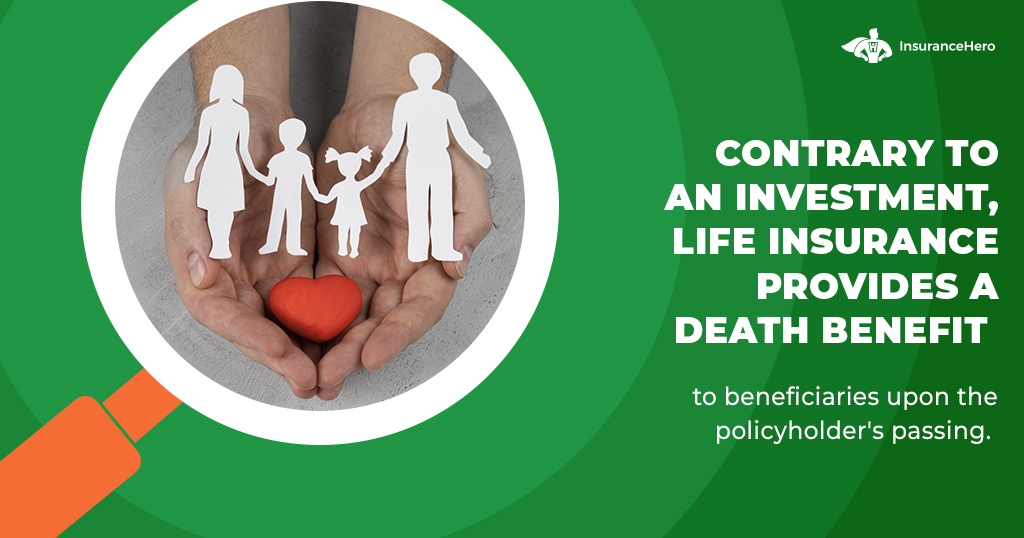
For most people, though, that number isn’t necessarily much when stretched out over time compared to if you had put the same amount of money into the stock market.
Financial experts have noticed that life insurance perks don’t usually add much to your piggy bank for when you retire.
Why? A large chunk of your first set of payments often goes to cover commission costs, which lowers the overall money value of the policy. Also, the policy’s worth can take a while to bounce back from these starting expenses.
There are a lot of variables that make it difficult to generalise here. For some people, receiving a death benefit from a loved one’s life insurance cover can be a life-changing amount of money. For others, as an annuity, it barely moves their financial needles.
What it comes down to, though, is that life insurance is insurance, not investment.
If you want your money to be put in a high-return growth account, there are investments for that. Life insurance serves a different purpose; even if that purpose isn’t the highest possible growth, it’s still a guaranteed benefit.
Reason 3: You Get Nothing if You Outlive Your Policy
If you purchase term life insurance, you pick a term for the cover to apply. It’s usually measured in decades: 10, 20, 30 years or thereabouts.
Your policy is locked in, and your cover is set during that term. If you pass away through illness, misfortune, or misadventure during that term, your death benefits are paid out when your beneficiary files a claim.
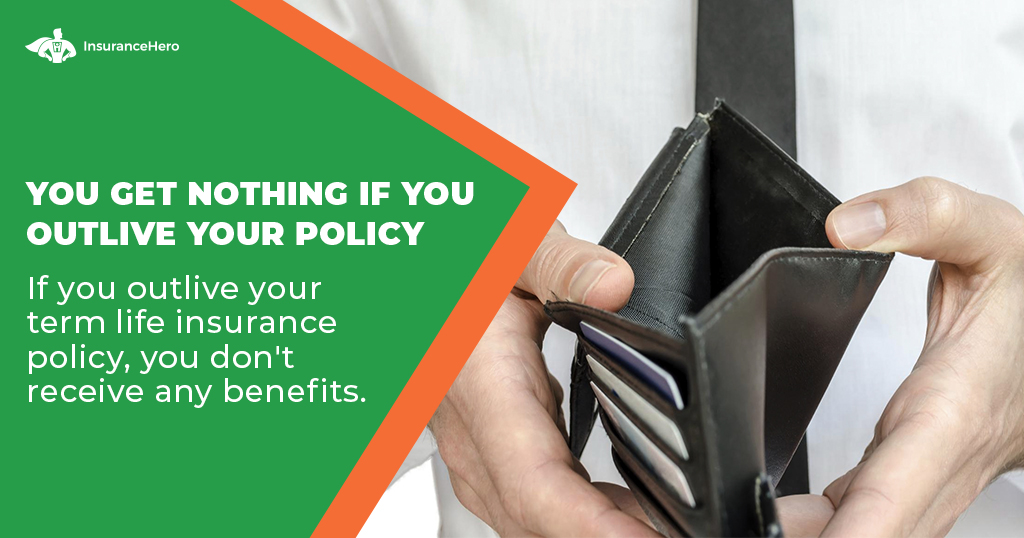
What happens if you buy a policy when you’re 50 for 30 years of coverage, only to turn 80 in good health? With term life insurance, you have two options: you can roll over into another term (or a whole-life) policy, or you can abandon cover entirely.
It’s true that if you choose not to renew your policy, you gain nothing from having that cover for those 30 years. However, is that really the truth? You gained something every year along the way: peace of mind. That life insurance cover was there to remind you that your loved ones are cared for even if something happens to you.
In a way, outliving your policy is “winning.” It means you’ve weathered the slings and arrows of life and come out the other side.
Reason 4: Life Insurance Companies Don’t Always Pay Out
Well, it’s true; life insurance companies are businesses, and if they paid out every policy they issued, they wouldn’t have the funds left to keep them going. Some claims don’t qualify, some are fraudulent, and some are rejected.
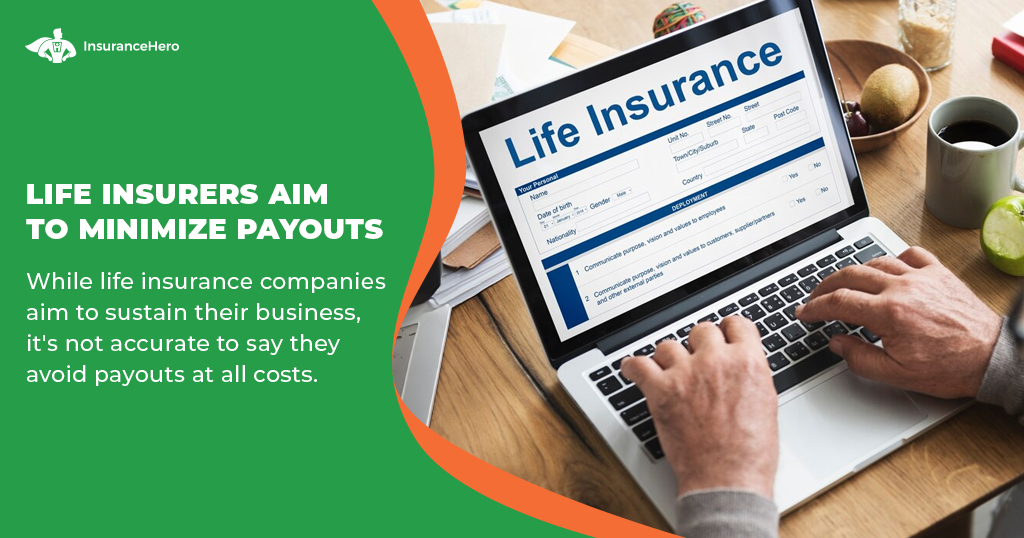
There are ways to ensure that you or your family does get paid out, however:
- Money from policies can be invested in faster-growing ventures to provide a return
- Some people inevitably outlive their policies and choose not to renew, having paid in without receiving money in return
- Some people will have their death benefits denied
It’s certainly true that life insurance companies would prefer not to pay out in cases where they shouldn’t, but they aren’t going to work obscure loopholes into their contracts just to wage war on the people expecting that cover.
There are valid reasons why life insurance doesn’t pay out. These include, primarily, cases of fraud. If you lie on your life insurance application, that lie can be caught posthumously and be the basis for a denied claim.
However, most policies have no reason to deny a claim. 97% of claims are paid out.
Reason 5: You Don’t Qualify for Life Insurance
Insurance companies examine various aspects of your health when determining whether or not they’ll issue you a policy. Your age, sex, and overall health are just part of the puzzle. They also look at any illnesses or diseases you may have, habits you’ve had throughout your life, and more.
Some insurance companies will choose not to issue policies to people with certain traits. For example, people with chronic illnesses like diabetes, cancer, HIV, heart disease, or asthma may not qualify for policies with these companies.
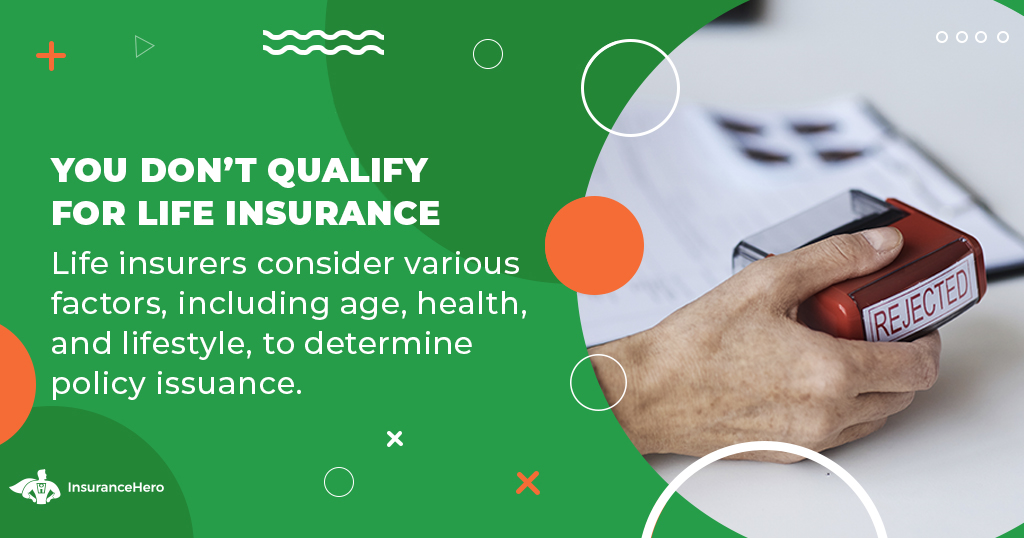
Generally, though, only the most restrictive insurance companies will issue policies to those in good health. Illness is a fact of life, and just because you have an illness doesn’t mean you aren’t managing it well.
People with cancer can be in remission. People with diabetes can have it under control. Many life insurance companies will still issue policies to these people, though they may be a little more expensive than for someone in perfect health.
A more likely reason for being declined is working in a high-risk profession or having a high-risk hobby. Pilots, roofers, steelworkers, truck drivers, police officers, and people with hobbies like skydiving, combat sports, and so on might find it harder to find cover.
The cover is out there, and we can help you find it. To get started, click here and fill out our form.
Reason 6: You Have Plenty of Assets Already
Life insurance is meant to provide for someone dependent on you should you unexpectedly pass away. If your passing would bring them hardship, particularly financial hardship, life insurance is a great option to help guarantee they’re taken care of.
What if you already have plenty of assets, though? Maybe you have a well-funded retirement account, an excellent pension, part ownership in a successful business, or a storeroom packed full of valuable collectables waiting to be sold.
Well, all of that may be true. Maybe your loved ones can mourn your passing without worrying about their financial futures.

One of the most significant issues with assets you leave behind is how readily they can be accessed. A stack of cash under the mattress is liquid and easily accessed; a bank account and an investment fund are easy to get rolling.
Others are a lot slower, like a share in a business or a pile of valuable comics or trading cards. They’re illiquid assets, meaning your loved ones may experience some hardship – or even become the victim of predatory buyers – in their need to liquidate those assets.
Life insurance paying out a death benefit gives a guaranteed form of liquid cash to your beneficiaries should you pass. For many, that time is a luxury that is all too often missing when they’re sorting out the details of your passing.
Reason 7: You’re Young and Healthy
One of the most common reasons why people choose not to get life insurance is that they’re young, healthy, and otherwise unafraid of dying.
After all, old age is decades away, you don’t get sick often, you don’t take unnecessary risks, and you’ve never been seriously injured. Why would you need life insurance?

To put it bluntly, this is foolhardy. While the young often feel invincible, it only takes a moment to take it all away. You may not take unnecessary risks, but if you drive anywhere, a car accident can cripple or kill you.
You might eat right and exercise, but cancer doesn’t care and can bring you from the peak of fitness to being bed-bound in months. You might be young, but how many millions of young people now have Long Covid and face much worse prospects than they were just a few short years ago?
None of us can predict the future. That’s the core of insurance: to provide some backing or guarantee to make even the worst events have a silver lining. Some might even argue that when you’re young and healthy is the best time to get life insurance cover; it’s when the losses are more likely to be devastating.
Reason 8: You Already Have Life Insurance Cover
Many people receive some form of life insurance as part of their job benefits package. It’s not guaranteed to be included, but many people see that they have life insurance coverage from their workplace and decide that’s good enough.
Unfortunately, the truth is that most workplace-provided life insurance cover is below the bare minimum you would get if you were deciding on your own.
Consider that many life insurance policies will offer a death benefit of 10 times the amount of your annual salary, but a workplace-provided cover might only offer 2x. It’s so much lower that it hardly even qualifies as something that could “provide” for your family after your passing.

In addition, while some benefits are carried with you (retirement accounts, for example), others are not. Life insurance coverage from your job only lasts as long as you have that job. That policy evaporates if you’re fired, laid off, or quit.
By purchasing your own cover, you don’t have to worry about it being barely anything or disappearing when you least expect it.
Reason 9: You Don’t Have Any Dependents
Another common reason not to get life insurance is that you don’t have kids. After all, one of the leading reasons to get life insurance is to take care of children when you pass. Why bother getting life insurance if you’re single and have no children?
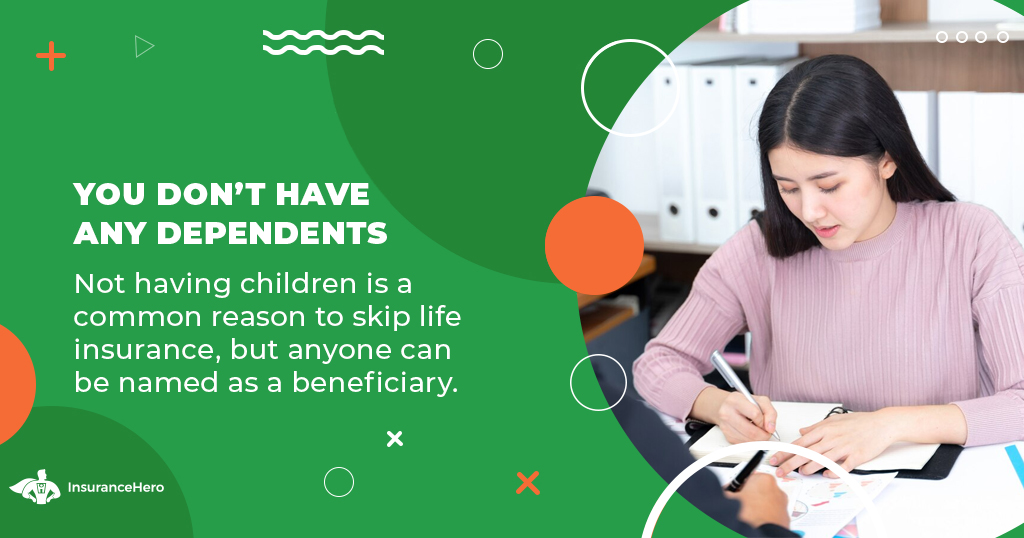
This can be a real challenge, but the truth is, you can name almost anyone a beneficiary. If you’re young enough and your parents are still alive, you can name them. If you have siblings, you can name them. If you have a trusted, lifelong friend, you can name them.
Even if you’ve lived a solitary life and have no one around you to call a loved one, you can even choose to name a charity as the beneficiary of your policy. It’s a slightly more complex process, but it’s entirely doable.
Reason 10: You Find the Process of Buying Life Insurance Confusing
Life insurance can be confusing. There’s a lot to consider, from the three parties involved to the burden of insurable interest, the differences between term and whole life, and all the various types of insurance.
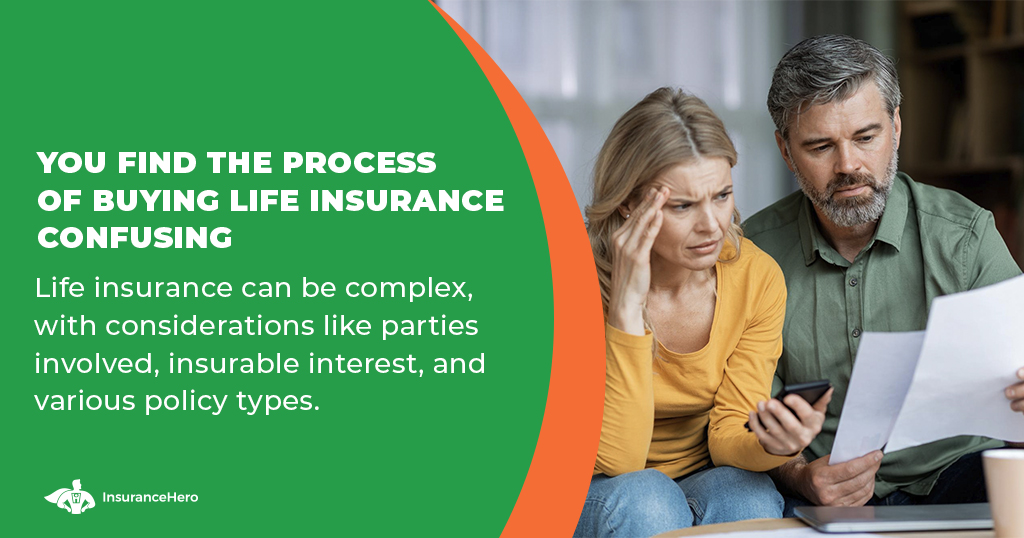
Fortunately, we’re here to help make the process simple. As experts in UK life insurance, we can answer any questions you may have.
And, if you’re ready to find a policy, all you need to do is fill out our form. We get quotes for policies from top insurers in minutes.
Getting Life Insurance At A Certain Age
Some people may want life insurance at a certain age because of their family’s needs. Younger people with very young families, like people over 35, over 40, or over 45 years old, may want a mortgage life insurance policy to ensure the parent who is left has an unencumbered home, offering the family the stability they need.
Older people, like those over 50, over 60 and over 70, may want to make provisions for their funeral and other costs they do not want to leave for their loved ones.
What about people who think they can’t get life insurance when they can?
Insurance Hero has received calls from partners of Firefighters, Farmers, and Scaffolders looking for cover for themselves and asking if their partner could get cover, expecting the request to be turned down or the cost to be prohibitive.
The outcome in each case was that coverage could be obtained, even for people with high-risk occupations. Both people could get coverage, and a cost-effective joint insurance policy could be put on risk.
Steve Case is a seasoned professional in the UK financial services and insurance industry, with over twenty years of experience. At Insurance Hero, Steve is known for his ability to simplify complex insurance topics, making them accessible to a broad audience. His focus on clear, practical advice and customer service excellence has established him as a respected leader in the field.


